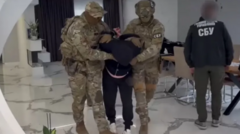As Xi Jinping and Vladimir Putin publicly embrace their partnership during the Moscow Victory Day parade, the underlying complexities reveal China's cautious balancing act between support for Russia and maintaining international relations with other partners, particularly in the face of U.S. tensions.
Xi and Putin: Allies with Boundaries in an Evolving Global Landscape

Xi and Putin: Allies with Boundaries in an Evolving Global Landscape
A nuanced analysis of the complex dynamics between China and Russia amidst their public displays of friendship.
While the world watched Xi Jinping and Vladimir Putin stand side by side during Moscow's Victory Day parade, framing their relationship as an "unbreakable" bond, there is a prevailing complexity much deeper than shared public displays. Xi's visit to Russia marked his 11th since assuming the presidency in 2013 and signified a calculated alliance, full of symbolism yet riddled with strategic caution.
Experts underline the dual nature of the Sino-Russian relationship, characterized by cooperation yet marked also by competition and tension. Mathieu Boulegue from the Center for European Policy Analysis notes that Xi's interactions with Putin are emblematic of a carefully managed friendship; they showcase camaraderie that is often juxtaposed with geopolitical realities. Xi’s careful positioning underscores a desire to maintain a strong partnership with Moscow, but one that does not alienate other prospective allies.
The backdrop of Xi's allegiance is Russia’s current geopolitical isolation due to its invasion of Ukraine, which has rendered Moscow an international outcast. Xi’s delicate balancing act seeks to fortify ties with Russia while reevaluating outreach to Western partners, particularly Europe. With the backdrop of economic tensions with the U.S., China remains wary of overexposure to Russia's deteriorating global standing.
This relationship has not gone unnoticed by European leaders, with recent exchanges signaling interest in bolstering bilateral ties with China. However, any proactive overtures may be undermined by China's close economic support for Russia, which complicates Xi's efforts to engage with Europe amidst ongoing sanctions against the Kremlin.
Xi’s message extends beyond mere diplomacy; it constitutes a defiance against U.S. hegemony and the potential strategic encirclement predicted by analysts as the U.S. continues its military support for Ukraine. Together, Xi and Putin present a united front, navigating their allegiance within a broader vision dismissing American influence.
Yet the reality of the relationship is asymmetrical; China’s enduring rise contrasts with Russia's diminished economic power, leading many to assert that Moscow’s dependence on Beijing has intensified. Analysts warn that Russia's needs are progressively overshadowing the partnership's balance, calling into question the genuine parity of the so-called alliance between Xi and Putin.
As Russia continues to lean on China amidst Western sanctions, prospective discord surfaces in their relationship. The façade of unyielding friendship masked potential friction points that might emerge as global dynamics evolve. While Xi and Putin project a robust front today, the future may reveal complexities that challenge their alliance, as they navigate the intertwined trajectories of national interests and global positioning.
Experts underline the dual nature of the Sino-Russian relationship, characterized by cooperation yet marked also by competition and tension. Mathieu Boulegue from the Center for European Policy Analysis notes that Xi's interactions with Putin are emblematic of a carefully managed friendship; they showcase camaraderie that is often juxtaposed with geopolitical realities. Xi’s careful positioning underscores a desire to maintain a strong partnership with Moscow, but one that does not alienate other prospective allies.
The backdrop of Xi's allegiance is Russia’s current geopolitical isolation due to its invasion of Ukraine, which has rendered Moscow an international outcast. Xi’s delicate balancing act seeks to fortify ties with Russia while reevaluating outreach to Western partners, particularly Europe. With the backdrop of economic tensions with the U.S., China remains wary of overexposure to Russia's deteriorating global standing.
This relationship has not gone unnoticed by European leaders, with recent exchanges signaling interest in bolstering bilateral ties with China. However, any proactive overtures may be undermined by China's close economic support for Russia, which complicates Xi's efforts to engage with Europe amidst ongoing sanctions against the Kremlin.
Xi’s message extends beyond mere diplomacy; it constitutes a defiance against U.S. hegemony and the potential strategic encirclement predicted by analysts as the U.S. continues its military support for Ukraine. Together, Xi and Putin present a united front, navigating their allegiance within a broader vision dismissing American influence.
Yet the reality of the relationship is asymmetrical; China’s enduring rise contrasts with Russia's diminished economic power, leading many to assert that Moscow’s dependence on Beijing has intensified. Analysts warn that Russia's needs are progressively overshadowing the partnership's balance, calling into question the genuine parity of the so-called alliance between Xi and Putin.
As Russia continues to lean on China amidst Western sanctions, prospective discord surfaces in their relationship. The façade of unyielding friendship masked potential friction points that might emerge as global dynamics evolve. While Xi and Putin project a robust front today, the future may reveal complexities that challenge their alliance, as they navigate the intertwined trajectories of national interests and global positioning.





















